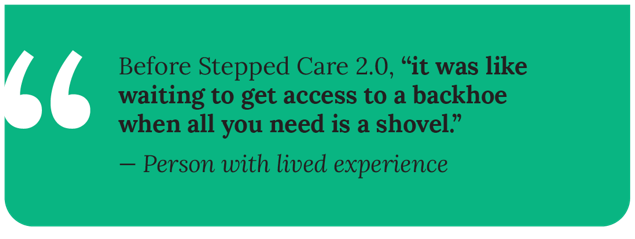If you are in distress, you can call or text 988 at any time. If it is an emergency, call 9-1-1 or go to your local emergency department.
- Fact sheets, Professional Resources
Stepped Care 2.0: value and benefits
Stepped Care 2.0© (SC2.0) is a transformative system of care for organizing and delivering evidence‑informed mental health and substance use services. It uses a person-centred, strengths‑based, recovery-oriented approach to provide timely, flexible access to a range of options — including formal and informal wellness and mental health services that best meet people’s needs and preferences. Because the failure to meet mental health needs comes at a high cost, SC2.0 offers people access to support when they are ready and comfortable with doing so. That is, the model is designed to best meet people’s needs and preferences through a range of formal and informal options, with benefits that providers also share. How does it benefit clients? During their first engagement with the SC2.0 system, people receive an intervention to address their primary concern and are supported by a community of care with meaningful connections and diverse options. In the MHCC demonstration project, about 80 per cent of clients reported that lower intensity options (such as e- mental health tools, or self-directed resources) met at least some of their needs. How does it benefit providers? SC2.0 gives providers more flexibility in their schedules. In the demonstration project, they also saw the model as an effective, evidence-based way to help their practices evolve. As well, providers reported much greater knowledge of the stages of change and more self- confidence to enact change. The SC2.0 model for systems of care is organized around nine steps, which can be populated with diverse, culturally relevant care options. The steps in the planning framework range from self-directed (lower intensity) services to acute care (higher intensity) services. As intensity increased across the steps, so too does stakeholder investment (i.e., time, effort and cost), and service user readiness to engage also increases. Service user decision-making is greatest in informal, self-directed services and decreases in formal acute crisis services. In acute care, readiness may be low for involuntary hospital admissions. The foundational values and philosophies upon which the SC2.0 model is built: Ready to learn more about Stepped Care 2.0©?This resource was published in 2021. The data may be out of date.
What is the value of SC2.0?

![On a blue background, the following quote is attributed to a care provider in Newfoundland and Labrador, "I have more time and flexibility. Clients come in or book a time with me when they want service [which] opens up my schedule."](https://mentalhealthcommission.ca/wp-content/uploads/2022/02/SC2point0-care-provider-quote.png)
SC2.0 Nine-Step Framework
Guiding Principles
- Fact sheets, Professional Resources
Stepped Care 2.0: value and benefits
Stepped Care 2.0: value and benefits
- e-Mental Health, Health-care Providers
Stepped Care 2.0© (SC2.0) is a transformative system of care for organizing and delivering evidence‑informed mental health and substance use services. It uses a person-centred, strengths‑based, recovery-oriented approach to provide timely, flexible access to a range of options — including formal and informal wellness and mental health services that best meet people’s needs and preferences. Because the failure to meet mental health needs comes at a high cost, SC2.0 offers people access to support when they are ready and comfortable with doing so. That is, the model is designed to best meet people’s needs and preferences through a range of formal and informal options, with benefits that providers also share. How does it benefit clients? During their first engagement with the SC2.0 system, people receive an intervention to address their primary concern and are supported by a community of care with meaningful connections and diverse options. In the MHCC demonstration project, about 80 per cent of clients reported that lower intensity options (such as e- mental health tools, or self-directed resources) met at least some of their needs. How does it benefit providers? SC2.0 gives providers more flexibility in their schedules. In the demonstration project, they also saw the model as an effective, evidence-based way to help their practices evolve. As well, providers reported much greater knowledge of the stages of change and more self- confidence to enact change. The SC2.0 model for systems of care is organized around nine steps, which can be populated with diverse, culturally relevant care options. The steps in the planning framework range from self-directed (lower intensity) services to acute care (higher intensity) services. As intensity increased across the steps, so too does stakeholder investment (i.e., time, effort and cost), and service user readiness to engage also increases. Service user decision-making is greatest in informal, self-directed services and decreases in formal acute crisis services. In acute care, readiness may be low for involuntary hospital admissions. The foundational values and philosophies upon which the SC2.0 model is built: Ready to learn more about Stepped Care 2.0©?
This resource was published in 2021. The data may be out of date.
What is the value of SC2.0?

![On a blue background, the following quote is attributed to a care provider in Newfoundland and Labrador, "I have more time and flexibility. Clients come in or book a time with me when they want service [which] opens up my schedule."](https://mentalhealthcommission.ca/wp-content/uploads/2022/02/SC2point0-care-provider-quote.png)
SC2.0 Nine-Step Framework
Guiding Principles
SHARE THIS PAGE
RELATED

Review our Assessment Framework for Mental Health Apps — a national framework containing key standards for safe, quality, and effective mental health apps in Canada.

To help expand the use of e-mental health services, we developed four online learning modules based on our Toolkit for E-Mental Health Implementation, in collaboration with the Centre for Addiction and Mental Health (CAMH).

Stepped Care 2.0© (SC2.0) is a transformative model for organizing and delivering evidence-informed mental health and substance use services.
